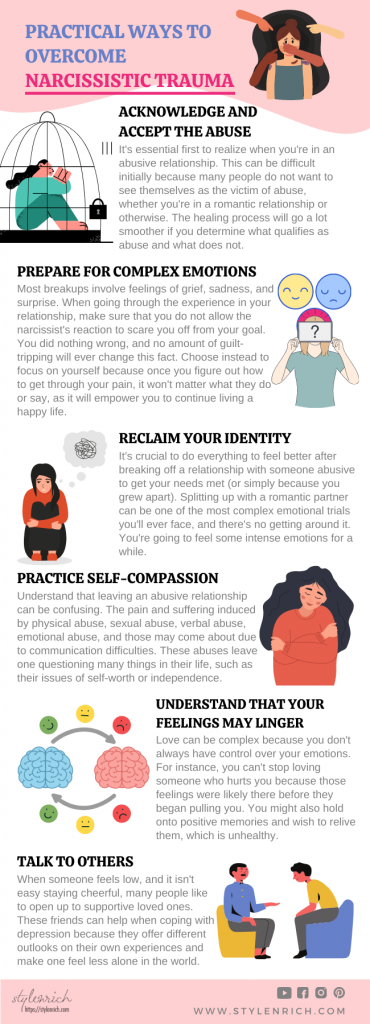Know the Practical ways to overcome such binding traits. A toxic relationship can look like a double-edged sword. Someone with a narcissistic personality disorder might be incredibly charming. People tend to gravitate towards them initially. It may become necessary to watch out for potential red flags with time. Someone with this disorder likely has a grandiose sense of self-importance. They are always preoccupied with fantasies of success, beauty or ideal love. A closer look will reveal someone who is arrogant and displays a lack of empathy and excessive attention-seeking.
The breakup in a narcissistic relationship can be just as painful as ending a romantic one. The sense of attachment that comes with love, whether healthy or toxic, is the same in both scenarios. Think about when you may have stayed around in an unhealthy relationship longer than you should have because that feeling was absent. You’re likely dealing with lots of hurt and confusion. Introspect to find out what sets these relationships apart from normal ones?

Acknowledge and accept the abuse
It’s essential first to realize when you’re in an abusive relationship. This can be difficult initially because many people do not want to see themselves as the victim of abuse, whether you’re in a romantic relationship or otherwise. The healing process will go a lot smoother if you determine what qualifies as abuse and what does not. Unfortunately, it takes time for your ex-partner to come around. While some might give up hope on the partner and move on, this mustn’t happen until the time is correct so that both parties can heal from any past hardships together without letting personal feelings get in the way.
Prepare for complex emotions
Most breakups involve feelings of grief, sadness, and surprise. When going through the experience in your relationship, make sure that you do not allow the narcissist’s reaction to scare you off from your goal. You did nothing wrong, and no amount of guilt-tripping will ever change this fact. Choose instead to focus on yourself because once you figure out how to get through your pain, it won’t matter what they do or say, as it will empower you to continue living a happy life.
Reclaim your identity
It’s crucial to do everything to feel better after breaking off a relationship with someone abusive to get your needs met (or simply because you grew apart). Splitting up with a romantic partner can be one of the most complex emotional trials you’ll ever face, and there’s no getting around it. You’re going to feel some intense emotions for a while. Those feelings can linger in your system if they aren’t adequately dealt with when they first present themselves. Such symptoms could include PTSD, anxiety and fear, among other things. Hence, it’s crucial that, as an entrepreneur, you check in with trusted confidants to re-evaluate yourself at this delicate time! A therapist is also a great idea so that you can be helped in dealing with the lingering effects of being abused by an intimate partner.
Practice self-compassion
Understand that leaving an abusive relationship can be confusing. The pain and suffering induced by physical abuse, sexual abuse, verbal abuse, emotional abuse, and those may come about due to communication difficulties. These abuses leave one questioning many things in their life, such as their issues of self-worth or independence. Despite any confusion that may be happening in your mind, you should understand that you’re not alone in this instance, and there is help available for you!
Understand that your feelings may linger
Love can be complex because you don’t always have control over your emotions. For instance, you can’t stop loving someone who hurts you because those feelings were likely there before they began pulling you. You might also hold onto positive memories and wish to relive them, which is unhealthy. Recognizing this as a part of the healing process is key to moving forward with life in a safe way for you.
Take care of yourself
Many times our life circumstances don’t allow us to be able to handle the amount of stress we face. A good exercise habit can benefit you in multiple ways. It would help if you incorporated wholesome activities into your daily routine. Just take a walk around your neighbourhood or practice some yoga poses while waiting for your coffee to brew.
Talk to others
When someone feels low, and it isn’t easy staying cheerful, many people like to open up to supportive loved ones. These friends can help when coping with depression because they offer different outlooks on their own experiences and make one feel less alone in the world.
When most people hear the word “narcissist,” they think of someone satisfied with themselves in a self-centred or arrogant way. Online communities like Narcissist Abuse Support offer support for those either involved in narcissistic abuse relationships or who have previously experienced these relationships. The group provides daily inspiration and hope for everyone to be better and more successful than ever.
Get professional support
There are so many reasons people don’t leave abusive relationships. Still, by going and speaking candidly with someone who isn’t involved in your life, you can explore those specific, personal motives. You can begin thinking about how you can better yourself no matter who is around you – be it friend or foe. Talking to a therapist one-on-one can help you take a significant step toward improving your emotional well-being.
Conclusion
Sometimes healing is a long process. But it’s important not to continue being on your own. Reach out to supportive friends and family members. If you’re in school, talk to a teacher or guidance counsellor. They might have one waiting just for you and your situation! If you think it will help, get in contact with a therapist who can help you recover quickly and easily.

















